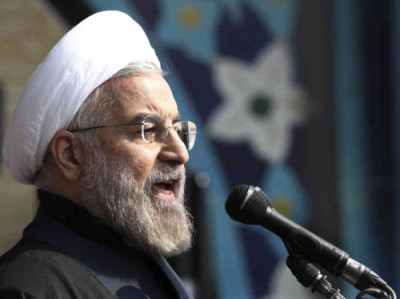LATEST: Culture War Between Government and Hardline Critics Continues
Facing hardline attempts to restrict his political and cultural initiatives, President Rouhani hit back at his critics on Wednesday.
“I do not think there has been such times like this where everyone can criticize the President, the administration and its policies with such ease,” Rouhani declared:
We accept criticism and consider it beneficial and necessary. Of course, criticism that is constructive, coupled with sympathy and with the goal of reforming affairs….
This administration has come to confront extremism. The worst forms of extremism are lies and accusations. The worse extremism is not telling the realities to the people.
Hardliners, with support from the Supreme Leader, have warned the President and his Ministers against support of “sedition”, through their proposed relaxation of restrictions on media and the Internet. The critics have also effectively blocked any release of political prisoners, including those detained after the disputed 2009 Presidential election.
Rouhani’s response is his first in more than two weeks, when he challenged “unnecessary” bans on newspapers.
Reformist publications such as Bahar and Aseman have been shut down since last autumn, while the Government has hit back by banning the hardline 9 Dey, owned by MP Hamid Rasaei and linked to the Endurance Front of Ayatollah Mesbah Yazdi.
(hat tip to Iran Tracker for translation)
Tehran Rejects Arab League Statement on Persian Gulf Islands
The Iranian Foreign Ministry has rejected a statement by the Arab League supporting the claim of the United Arab Emirates of sovereignty over three islands in the Persian Gulf.
Spokeswoman Marzieh Afkham said “The three islands of Greater Tunb, Lesser Tunb, and Abu Musa have been, and will be inseparable parts of Iran.”
The three strategically important islands, situated in the Strait of Hormuz have the potential to control access to the Gulf, have long been contested by the UAE after Iran asserted its sovereignty over them in 1971 following Britain’s withdrawal from the region.
The issue of the three islands is a thorn in the side of Tehran’s pursuit of expanded ties with the Gulf states.
Culture War Between Government and Hardline Critics Continues
The war over culture between the Rouhani goverment and its hardline critics continues today with both sides defending their positions. Hardliners, including Head of the Judiciary Sadegh Larijani and Revolutionary Guards Commander Mohsen Kazemeini, stressed the need to focus on cultural issues in order to protect the Islamic Republic from “enemies.”
See Iran Special: The Supreme Leader, The Holocaust, and the Internal Culture War
Larijani backed the Supreme Leader’s New Year statement on culture, saying “Cultural discussions are so important that cultural work must be done for executing many economic changes and designs…Of course, cultural engineering is more than just physical and judiciary confrontation. This matter was explicated and determined well in the statements of the Supreme Leader and all must pay attention to it.”
Kazemeini took a similar line to Larijani, declaring “The enemies of the Islamic Republic have concluded that they do not have the capability of waging hard war against the Islamic Republic system, therefore they have chosen cultural transmutation.”
The government also came under more direct criticism, as Larijani increased the pressure on Foreign Minister Mohammad Javad Zarif for allowing EU Foreign Policy chief Catherine Ashton to meet with womens rights activists while in Tehran.
According to National Security and Foreign Policy Parliamentary Commission member MP Javad Karimi Ghodousi, Larijani issued a “warning” to Zarif and said that if such meetings occur again, “The Judiciary will directly enter into action.”
The government, however, has not remained silent in the face of hardline criticism with Islamic Culture and Guidance Minister Ali Janati defending the recent closure of the newspaper 9 Dey, which is closely linked to the hardline Endurance Front.
Janati said, “The Supervisory Board on the Media has seven members [from various government organs]…The board decided to shutdown 9-Day weekly when multiple warnings were ignored.”
(Hat tip to Iran Tracker for translations)
Journalist Zeidabadi Given Prison Furlough
Ahmad Zeidabadi, journalist and the head of the Tajkim-e Vahdat student alumni organization, has been given furlough from Evin Prison.
Zeidabadi, detained just after the disputed President election of June 2009, is serving a six-year prison term with exile to Gonabad in northeast Iran. He is banned for life from social and political activity.
Families say more than 50 other political prisoners were denied Nowruz furloughs by head of judiciary Sadegh Larijani, reportedly because of anger over the meeting of European Union foreign policy chief Catherine Ashton with women’s rights activists in Tehran.
Iran Summons Pakistan Ambassador Over Killing of Abducted Border Guard
Tehran maintained its pressure on Pakistan over the killing of an abducted border guard by the Sunni insurgency Jaish ul-Adl last week, summoning the Pakistani Ambassador to Iran “to explain why Islamabad has kept indifferent” to execution.
Jaish ul-Adl kidnapped five guards on February 6 in southeastern Iran and took them across the border. The group, which has demanded the release of 300 detainees from Iranian prisons in return for the men, has threatened to kill another guard at the start of next week.
Foreign Minister Mohammad Javad Zarif used his Facebook page to send an open letter to United Nations Secretary-General Ban Ki-Moon: “It is extremely regrettable that all available evidence indicates that these cowardly acts of terror…have been perpetrated by State-sponsored extremist groups, with similar patterns of funding, coordination, support and direction.”
Zarif did not name the State backing Jaish ul-Adl.

